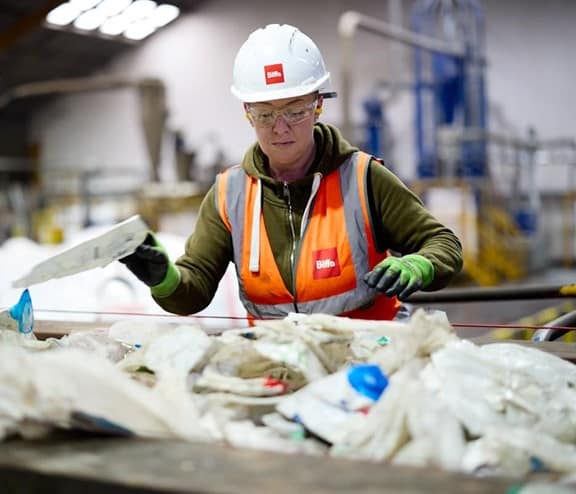
Biffa report: 16,000 new jobs in £18bn UK waste net-zero transformation
Vision includes new UK recycling and energy facilities
Call to phase out waste exports and increase food redistribution
A new report by leading sustainable waste and recycling firm Biffa reveals a once-in-a-generation opportunity for the UK to make an £18 billion investment in dozens of new onshore recycling and energy facilities that will deliver the country’s ambitions for a net zero, circular economy.
Improving the recyclability of household packaging, banning plastic waste exports and increasing surplus food redistribution would also play key roles.
The move would unlock 43 million tonnes of circular raw materials annually to support sustainable manufacturing and consumption in the UK, creating 16,000 high-quality jobs, reducing carbon emissions by up to 7.1 million tonnes a year, and improving domestic energy security.
The report, called ‘From Waste Hierarchy to Carbon Hierarchy: Biffa's Blueprint for Waste Net Zero’ says the UK’s waste sector has transformed from a landfill-dependent model to one prioritising recycling and energy recovery.
The report recognises the huge progress made, with UK household waste to landfill falling by 50% from 2010 to 2020, and carbon emissions reducing by 69% from 1990, making the UK’s waste sector a stand-out contributor to carbon reduction.
In the report, Michael Topham, Biffa’s Chief Executive Officer, says: “Nonetheless, whilst this transition is to be celebrated, the task is nowhere near complete. The UK still produces too much waste and doesn’t recycle enough of it.
“After nearly two decades of success, recycling levels in the UK have plateaued at around 44 per cent. Too many materials are not designed for recyclability, and collections systems are often inconsistent and unclear. And where we do recycle, we remain too dependent on export markets as an end destination for materials.”
Topham says the transformation can be achieved using “existing, proven technologies and processes, and that there is a vibrant, competitive, skilled sector with the access to the capital to make this happen”.
He added: “Society supports this drive and the UK’s governments are committed to implementing policies to help make this happen. All that is needed now is for sensible policies that provide long-term certainty to be implemented without delay.
“At Biffa we have the skills, capital, and ambition to play a leading role in delivering this vision for a net zero, circular economy.”
Jacob Hayler, Executive Director of the Environmental Services Association, said: “ESA members, including Biffa, have played a key role in delivering the vital jobs and infrastructure that have moved the UK away from a landfill-dependent society to one where half of everything we throw away is recycled – saving vast quantities of carbon emissions in the process.
“But the job is far from done and our members stand poised to invest billions more to help the UK reach its ambitious recycling and net-zero targets, provided that the UK policy and regulatory landscape supports and protects this next generation of circular economy investment.”
For the full report, visit Publications | Biffa